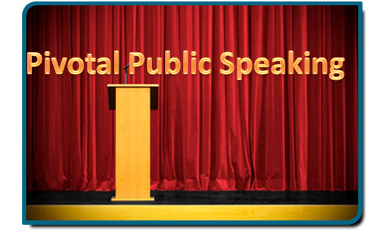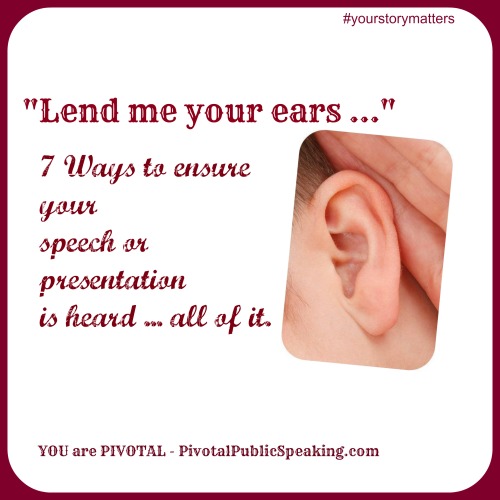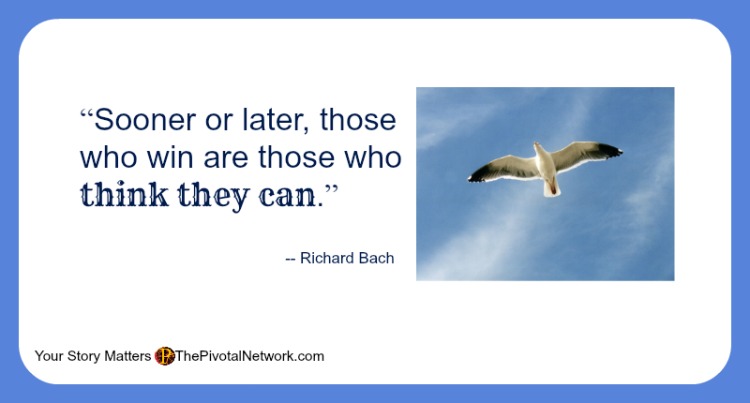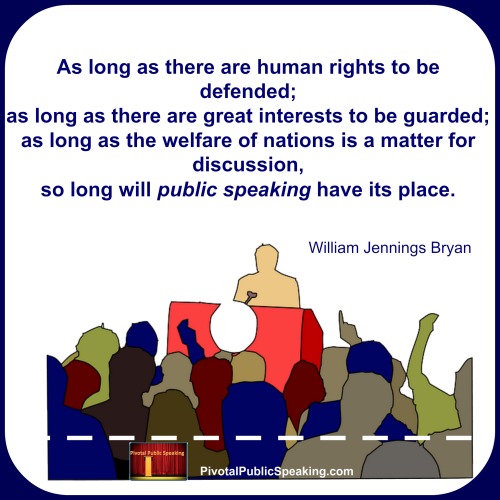
Pivotal Public Speaking -
the ezine
Instructions on how to subscribe or unsubscribe are at the bottom of the ezine.
Click here to view the ezine online.
Please feel free to forward this ezine to someone who might enjoy it.
Issue Number 181
Hello,
Welcome to this edition of the Pivotal Public Speaking ezine.
Featured article ... Does public speaking give you a nervous rash?

About that rash …
Yes that rash … the one you were telling me about at the networking meeting.
“Oh public speaking,” you said, “I hate public speaking. I always get that rash that spreads up my neck. So embarrassing! I have to wear a scarf!”
Is it because of the rash that you hate public speaking or is it that you hate public speaking and consequently get a rash?
Or is it that you don’t mind public speaking, or you wouldn’t mind public speaking? In fact you would probably enjoy it, but somewhere someone said something that gave you the idea that you would be judged every time you spoke or that the stakes are high every time you speak – be careful!
And that created stress.
Stress releases cortisol and adrenaline into your system and both are known to affect the skin.
Or it could be that you are having an allergic reaction caused by stress.
Either way you need to relieve yourself of the stress. That way you bring back the enjoyment you expect from public speaking and the freedom to speak without worrying about that rash.
And in this case, though not for everyone, it was caused by fear of
being judged and fear of failure.
And what could you use, what thought pattern could you introduce, what
story could you tell yourself so that you lost those fears?
The first step is to lose the focus on you. Yes I know there might be a rash, but there won’t be if you stop focussing on you, your being judged, your risks in the high stakes outcome.
The second step is to focus on having a conversation with your audience.
Look at it as a stylised conversation, perhaps, but don’t call it
“public speaking”. This is different, if only so that it’s no longer
associated in your mind and adrenal glands with the ”thing” (“public
speaking’) that causes the anxiety, the stress, the rash.
And in this conversation, just as in any conversation, engagement and connection occur naturally. Be a natural, not someone being judged on a performance.
And while you are focussing on that audience and the conversation, think about what you are doing for them. What are you giving them that they need or want or like? Start with the mindset of service, of win-win for you and them. Research them and uncover what they need/want/like and appreciate and then give that. Make them aware, and reassure yourself, that you are there to serve.
It is not about you. It is about your audience and your service to them.
So while the high stakes may involve making a sale or persuading or impressing, that sale, that persuasion, that impression will all be made so much easier and less stressful if you aim to serve and make it obvious that that is your aim. And the outcomes will be so much more abundant as well.
Win-win for all concerned.
Know that your new techniques will take away the feeling of being judged and the stress of high stakes outcomes. Know that all you need to do is know your audience, hold a stylised conversation with them and offer them service. And the anxiety drops. The stress drops. The adrenalin and the cortisol drop. The rash goes and public speaking becomes something to anticipate with pleasure.
You CAN do this!
…..
Now … about that adrenalin addiction – that adrenalin habit, the one you told me about at the dinner last night – ah that’s a whole other article…!
= = = =
© Bronwyn Ritchie
If you want to reproduce this article, please do so, but please include with it this resource box
Reproduced with permission from Bronwyn Ritchie’s Pivotal Public Speaking Ezine.
This week's Quotation about Public Speaking ...
"As long as there are human rights to be defended; as long as there are great interests to be guarded; as long as the welfare of nations is a matter for discussion so long will public speaking have it place." ~William Jennings Bryan
In my current obsession with storytelling, I have discovered a Hopi Proverb which says the "Those who tell the stories rule the world."
Leaders everywhere are those who give their followers something to believe in, a narrative that explains the present and paints a future.
And leaders are not just those in government or religion. They lead in business, they lead in our institutions, they lead in our families.
We all have the capacity to be a leader at some time.
I am only thankful that the skills of public speaking are there to give us the power to lead and to create a world with values that we can uphold.
[Quick public speaking tip] Are you being heard?

If your audience cannot hear you, you have lost them.
If there is no microphone, and even if there is, it is your
responsibility, in the end, to make sure people can hear you.
1. Project your voice - right to that back row.
2. Articulate well. Practice overdoing it sometimes - hilarious, I know,
but a great way to remind you voice muscles that they are expected to
work for you and to say words properly without slurring, mumbling,
muttering or leaving off the ends of words. In today's fast-paced world
we sometimes develop lazy habits.
3. Take the time to pronounce each word properly. Research every word
you use so you don't get caught. You may be heard, but it's going to be
distracting if you mispronounce something, or stumble over it.
4. Using abbreviations or acronyms? Unless they are in common usage,
they might as well have been whispered if someone in your audience has
not idea what you mean.
5. You will have made the effort to visit the venue if at all possible
before you present. While you are checking it over for all
possibilities, remember to check the accoustics, and the microphone.
6. Have someone you can call on to deal with unforeseen issues like a
noisy air conditioner, a noisy audience member or a noisy microphone. If
there is no someone, have a disaster management plan in place.
7. Don't forget to make your audience very aware that you have their
interests at heart, that you are meeting their needs, and that you are
all in this together, or they will stop listening anyway.
And, in the end, there is always that old tried and true phrase "lend me
your ears" - well --- maybe!
Closing Thought

"Sooner or later, those who win are those who think they can." ~ Richard Bach
My very best wishes for the coming week,
Bronwyn
Please forward this ezine to someone who might enjoy it
For more tips, articles and courses to improve your Public Speaking visit
Subscriptions:
To subscribe to the Pivotal Public Speaking ezine, send a blank email to subscribe@consultpivotal.com with the words subscribe public speaking in the subject line.
I will not give or sell your email address to anyone for any reason.
To unsubscribe. send a blank email to subscribe@consultpivotal.com with the words unsubscribe public speaking in the subject line
